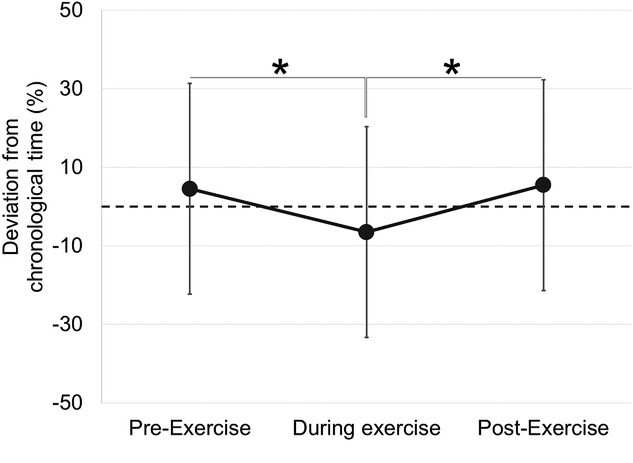You’re in the gym, and it’s nearly the end of your workout. You’re finishing on the stationary bike, so you hop on and get pedaling, dreaming of what you’re going to cook for dinner…but then you look at the clock. You’ve been cycling for longer than that, right? According to a new study, time really can seem to move more slowly when we’re exercising.
Something so everyday as how we experience the passage of time is still quite the scientific mystery. Lots of scientists are exploring these questions – just recently, a study threw doubt on the idea that we have a universal internal clock by demonstrating that changing how an image looks can alter someone’s time perception while they’re observing it.
Einstein himself used this concept to explain his theory of relativity in a way that most people can intuitively grasp: “When a man sits with a pretty girl for an hour, it seems like a minute. But let him sit on a hot stove for a minute – and it’s longer than any hour. That’s relativity.”
Now, a new study has investigated this effect in 33 people while they worked out on a stationary exercise bike. A 4-kilometer (2.5-mile) virtual course was projected on a screen, and participants were instructed to try and complete the course as quickly as possible. After an initial “familiarization” trial, they returned to try out the course under three different conditions in a random order:
- Solo, where only their own virtual avatar was visible on the course;
- Passive opponent, where another avatar was on the course too, but not directly competing with them;
- Active opponent, where the participant was instructed to race the other avatar on the screen and try and complete the course first.
Before, during, and after the trial, participants were asked to estimate when a 30-second interval had passed. They weren’t given any numerical information about their heart rate or performance during the cycling trials, so as not to interfere with this task.
Comparing the results during the cycling trials with those before and after revealed that time ran “slower” for the participants while they were in the middle of their workout. If that’s not an argument against signing up for a spin class, we don’t know what is.
Interestingly, the different experimental conditions had no significant impact. Whether they were racing against an opponent or cycling solo, the participants’ time perception wound up about 9 percent off the pace, meaning their internal idea of time was a little ahead of the clock.
Mean (± standard deviation) percentage difference between chronological time and perceived time pre-exercise, during, and post-exercise.
This was a small study, with just 33 people who were all already physically active. This does limit the generalizability of the results, as co-first author Professor Andrew Edwards of Canterbury Christ Church University explained in a statement:
“While the participants weren’t professional cyclists, they were in good physical shape, which isn’t true of everybody. The sample size of 33 people offers an intriguing first glimpse into how our perception of time can be warped – and perhaps a clue as to how to take things to the next level while exercising.”
“Our findings have important implications for healthy exercise choices, enjoyment levels and also for how we use this information to optimise performance.”
So next time you’re in the gym, trying to ignore the grunts of the person next to you while questioning whether the clock has stopped, this might explain why.
The study is published in the journal Brain and Behavior.
Source Link: Time Seems To Move Slower In This One Place, And You Might Be Going There Today
